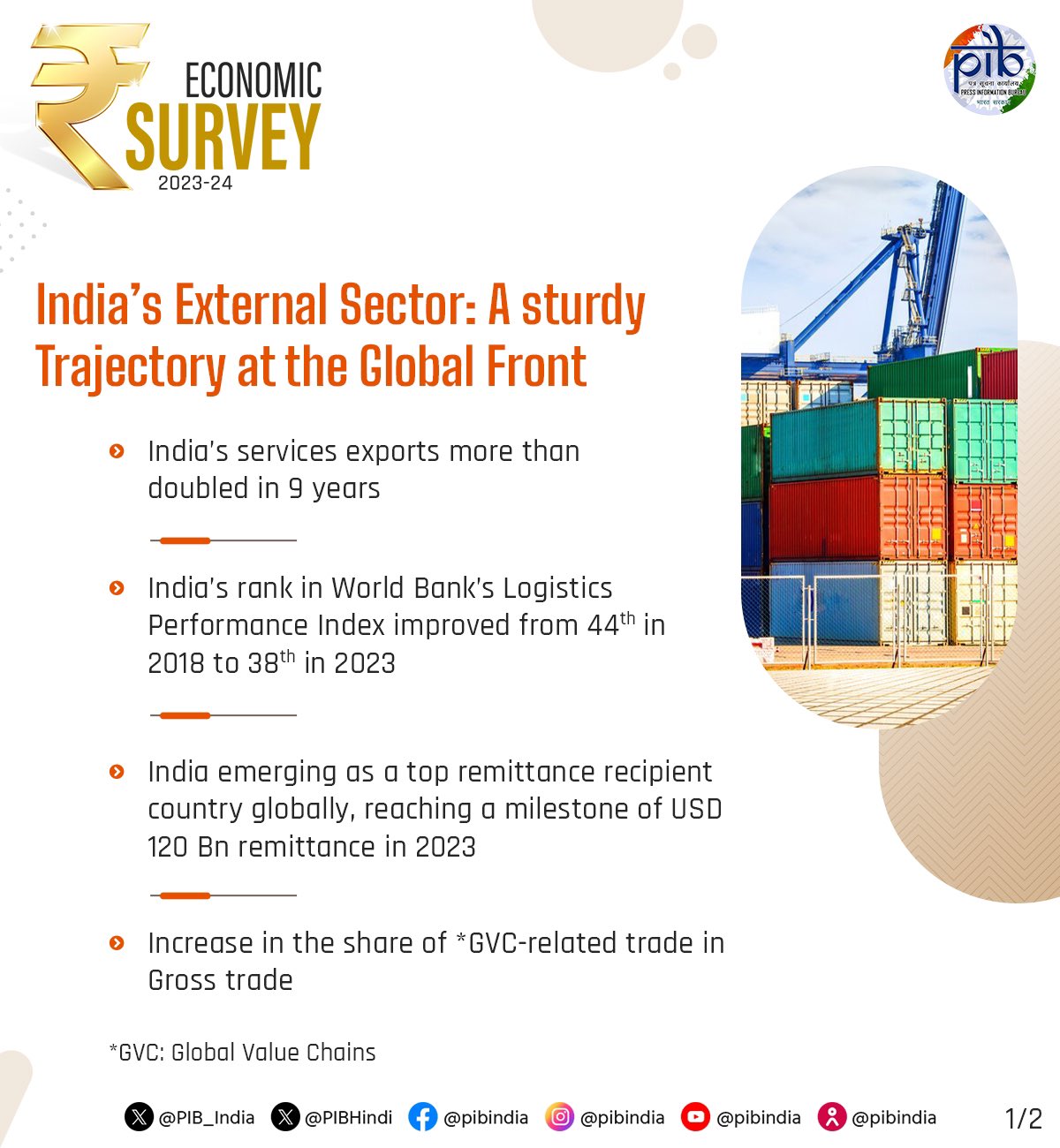New Delhi: India’s external sector has demonstrated notable resilience amidst ongoing geopolitical headwinds, with significant improvements in trade deficit and a strong performance in services exports, according to the Economic Survey 2023-24 presented by Union Minister for Finance and Corporate Affairs Smt. Nirmala Sitharaman in the Parliament today.
The survey reports a remarkable reduction in the overall trade deficit from USD 121.6 billion in FY23 to USD 78.1 billion in FY24. Services exports continue to be a major contributor to this improvement, with India’s share in global services exports rising from 0.5% in 1993 to 4.3% in 2022, making India the seventh-largest services exporting country globally, up from 24th position in 2001.
Surge in Services Exports
India’s services exports, particularly in software/IT and business services, have seen substantial growth. This surge is bolstered by India’s emergence as a hub for Global Capability Centres (GCCs). The country now ranks second in the world in telecommunication, computer, and information services exports, sixth in personal, cultural, and recreational services, and eighth in other business services.
As of March 2023, India hosts over 1,600 GCCs, up from about 760 in 2012. This growth in GCCs is reflected in the services Balance of Payments (BoP), with ‘Other Business Services’ becoming the second-largest contributor to services exports in FY24, holding a 26% share.
Strong Merchandise Trade Performance
Despite a slowdown in global demand, India’s merchandise trade performed robustly with exports crossing USD 776 billion and imports reaching USD 898 billion in FY23. The merchandise trade deficit narrowed to USD 238.3 billion in FY24 from USD 264.9 billion in the previous year.
India’s exports of engineering goods, electronic goods, and drugs & pharmaceuticals increased in FY24, enhancing the country’s share in world electronics exports and maintaining a strong foothold in the pharmaceuticals sector. Despite high domestic demand, merchandise imports contracted by 5.7% in FY24, indicating potential investments in industrial infrastructure and technological upgrades.
Government Initiatives and Policy Measures
The government’s targeted measures have fostered robust growth in specific export sectors, such as defence, toys, footwear, and smartphones. The share of electronics goods in merchandise exports rose from 2.7% in FY19 to 6.7% in FY24. Efforts to reduce logistics costs and improve efficiency include the PM GatiShakti National Master Plan and the National Logistics Policy (NLP). Digital reforms like the Unified Logistics Interface Platform (ULIP) have further enhanced logistics.
International Trade and Global Value Chains
The survey emphasizes India’s commitment to an open, inclusive, and rule-based international trade system with the WTO at its core. India’s participation in global value chains (GVCs) has increased, with the share of GVC-related trade in gross trade rising to 40.3% in 2022 from 35.1% in 2019. Government incentives through schemes such as the PLI and Districts as Export Hubs (DEH) initiative have revitalized GVC participation.
Current Account Deficit and Capital Flows
India’s Current Account Deficit (CAD) narrowed to USD 23.2 billion (0.7% of GDP) in FY24 from USD 67 billion (2% of GDP) the previous year. Net services receipts and remittances played crucial roles in this reduction. Net capital flows stood at USD 86.3 billion in FY24, driven primarily by foreign portfolio investment (FPI) flows and net banking capital inflows.
Foreign Direct Investment and Foreign Exchange Reserves
Although net FDI inflows declined from USD 42 billion in FY23 to USD 26.5 billion in FY24, gross FDI inflows remained stable. India’s foreign exchange reserves increased by USD 68 billion in FY24, the highest among major foreign exchange reserves-holding countries.
Future Outlook
The Economic Survey projects further reduction in India’s trade deficit and an increase in global market share for the country’s exports, bolstered by the recently signed Free Trade Agreements (FTAs). Challenges such as fluctuating global demand, rising trade costs, and commodity price volatility remain, but India’s improving trade infrastructure, quality standards, and stable policy environment are expected to strengthen its position as a global supplier of goods and services.





